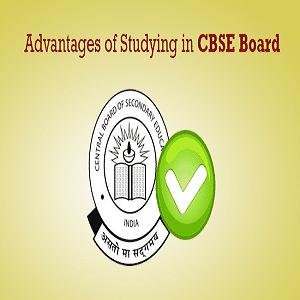What Are The Advantages Of Studying In a CBSE School?
 CBSE or the Central Board of Secondary Education is the national board of education in India. It was formed in 1962. The purpose of the Board was to create uniformity in education for all students across the country. It is controlled and managed by the Union Government of India. Currently, there are 21,271 schools in India affiliated with the CBSE Board. CBSE follows the National Council of Educational Research and Training (NCERT) curriculum. CBSE conducts class 10 and class 12 final exams in March every year. There are 220 CBSE affiliated schools in 28 foreign countries.
CBSE or the Central Board of Secondary Education is the national board of education in India. It was formed in 1962. The purpose of the Board was to create uniformity in education for all students across the country. It is controlled and managed by the Union Government of India. Currently, there are 21,271 schools in India affiliated with the CBSE Board. CBSE follows the National Council of Educational Research and Training (NCERT) curriculum. CBSE conducts class 10 and class 12 final exams in March every year. There are 220 CBSE affiliated schools in 28 foreign countries.
Parents around the country including that of children studying in CBSE Board schools in Nashik often express that CBSE was their choice to provide their children with better training to handle competitive exams after school. This is one of the many advantages that the CBSE Board offers. CBSE is known as a student-centred board than a syllabus-centred board.
The advantages of studying in CBSE board schools in Nashik and around the country are as follows –
1. The CBSE curriculum is designed to be more interactive and playful. The chapters include a lot of activities that will help the students learn concepts with a practical approach. An entirely theoretical curriculum can sometimes become monotonous and students may lose focus from the study material. Therefore, an activity-filled curriculum will make the delivery of knowledge more interesting. The CBSE syllabus is also easier than any other board.
2. The CBSE curriculum undergoes regular review and is updated according to the best interests of the students. CBSE aims to keep the knowledge that they are imparting, useful in the modern world for the students and is relevant to the environment the students are growing up in. This is further substantiated by training programmes for educators and administrators from time to time via service training workshops.
3. Exams of the CBSE Board are designed to test the knowledge of the student that does not necessarily require them to mug up the study material. The approach to exams is simplistic and aims to test the students on how much they have learned. The evaluation system is different in terms of gradation.
4. CBSE Board also encourages schools to include a lot of physical and extra-curricular activities into the yearly curriculum. They believe that the growth of a student need not be only in terms of knowledge from books. Growth also needs to be social, emotional, and practical.
5. As mentioned at the beginning of the article, the CBSE curriculum caters to preparing students for national entrance exams that they would undertake for undergraduate courses. IIT and AIIMS aspirants are greatly benefitted from studying under the CBSE Board.
6. One of the biggest advantages of the CBSE curriculum is the choices they provide to the students. Instead of restricting education to set rules, they allow students to choose between subjects, extra-curricular activities, and even questions to answer in exams. At each stage of education, students are free to pursue their interests instead of being bound by streams. This allows the students, flexibility even after school while selecting a subject for undergraduate education.
7. CBSE board, as mentioned above, is the national education board of India. Therefore, if a student was to move from a CBSE board school in Nashik to a CBSE school anywhere else in India, the student would have no issue adjusting to the curriculum of the new school. CBSE Board equalizes education standards all over India and schools are only allowed to accommodate certain minor changes.
8. The medium of instruction in CBSE schools is either English or Hindi. Being the most spoken language in India, children can easily communicate anywhere across the country. This ability will help them for the rest of their lives, even as professionals.
Having stated the above advantages of the Central Board of Secondary Education, it is important to note that this does not mean that ICSE, State, or any other boards are deficient. All education boards have the welfare of children education as their priority. The differences only lie in the structure of the curriculum. Parents may compare multiple boards when choosing a new school at a primary level. However, parents don't need to move their wards from other boards to CBSE simply because of the above points. For one, CBSE schools are in most cases more expensive than their State counterparts. It offers a stronger structure to the curriculum with its flexibility. CBSE offers more leniencies towards the students than other boards.
Students sometimes also choose to transfer to a CBSE school for class 11 and 12 which can, in turn, benefit them for the competitive exams after school. Many competitive exams until much recently, were held by CBSE and therefore, they can provide appropriate training so that students can comfortably appear for the exams.

.jpg)